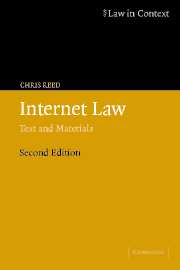Book contents
- Frontmatter
- Contents
- Preface
- Table of UK Statues
- Table of statutes–foreign jurisdictions
- Table of European Communities legislation
- Table of Conventions and Agreements
- Table of cases
- Introduction
- 1 The Internet as a distributed environment
- 2 From each according to his ability : actors and activities in the Internet world
- 3 An infinity of scarce resources : ownership and use of Internet resources
- 4 New actors on a new stage : intermediary liability in the Internet world
- 5 On the Internet, nobody knows you're a dog: identity and identification
- 6 Old wine in new bottles : traditional transactions in the Internet environment
- 7 The long arm of the law : cross-border law and jurisdiction
- 8 Legislative and regulatory arbitrage
- 9 Enforceability in the Internet environment
- 10 Facing the legislative and regulatory challenge
- Index
9 - Enforceability in the Internet environment
Published online by Cambridge University Press: 05 June 2012
- Frontmatter
- Contents
- Preface
- Table of UK Statues
- Table of statutes–foreign jurisdictions
- Table of European Communities legislation
- Table of Conventions and Agreements
- Table of cases
- Introduction
- 1 The Internet as a distributed environment
- 2 From each according to his ability : actors and activities in the Internet world
- 3 An infinity of scarce resources : ownership and use of Internet resources
- 4 New actors on a new stage : intermediary liability in the Internet world
- 5 On the Internet, nobody knows you're a dog: identity and identification
- 6 Old wine in new bottles : traditional transactions in the Internet environment
- 7 The long arm of the law : cross-border law and jurisdiction
- 8 Legislative and regulatory arbitrage
- 9 Enforceability in the Internet environment
- 10 Facing the legislative and regulatory challenge
- Index
Summary
‘The questions to be asked of any law or regulation that purports to govern activity on the Internet is not whether it is applicable, but rather whether it is enforceable? Though it may be in vogue to call for regulation, the primary question that should govern whether or how a regulation should be framed is not whether it is applicable – it will almost certainly be so. The question must be whether the regulation is needed, and if so, whether it is enforceable in a coherent and satisfactory manner. If regulations are not needed or do not prove to be enforceable due to the jurisdictional or substantive issues then there is a threat that users of the Internet will hold them in contempt.’
This distinction between applicability and enforceability is fundamental to the future development of Internet law. It is a comparatively easy task for a legislator to draft a law which applies to a particular activity undertaken via the Internet, but much more difficult to frame the law so that it is enforceable in practice. Laws which are unenforceable have two major defects; not only do they fail to deal with the mischief which the law seeks to remedy, but the knowledge that they are unenforceable weakens the normative force of other laws.
- Type
- Chapter
- Information
- Internet LawText and Materials, pp. 291 - 306Publisher: Cambridge University PressPrint publication year: 2004
- 1
- Cited by



